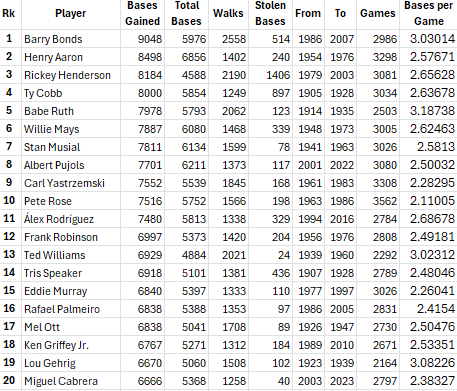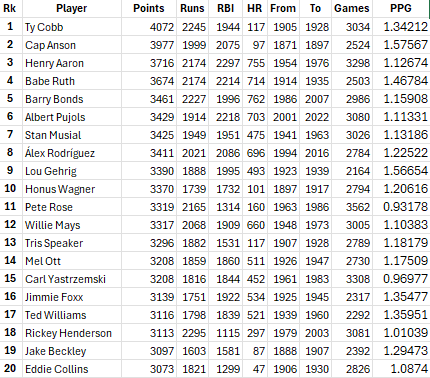Photo credit: Tage Olsin
The extraordinary seasons of Shohei Ohtani and Aaron Judge, and Pete Rose's recent passing, prompted me to finally do something I have wanted to do for a long time: create the statistics I want to see.
These are not "advanced stats" for the analytic nerds ("that guy actually sucked considering the home field he played in," etc.). The stats I had in mind are quite simple. They may exist elsewhere because others could have easily thought of them. But instead of spending more time trying to find them, I decided to subscribe to Stathead to get the data I sought. I then set up the computations I wanted on a spreadsheet.
The statistics are Bases Gained and Scoring.
The idea comes from football. I value total yards from scrimmage more than career rushing yards or receiving yards, and total touchdowns more than how the touchdowns were scored. Yes, Jerry Rice tops both lists, and almost all of the yards and touchdowns came from receiving, but not all. In addition, it's not obvious to me that among running backs, the all-time rushing leader would also lead all running backs in total yards, because some running backs were more significant pass-catchers than others. (Yes, Emmitt Smith does lead all RBs in rushing yards and yards from scrimmage, but I thought the scrimmage leader could be Walter Payton.)
I was thus curious about baseball's offensive statistics, where bases are like yards and runs are like touchdowns.
Bases Gained is Total Bases* plus Bases on Balls (walks) plus Stolen Bases. It measures a player's productivity on offense independent of the batting production of teammates; it's what he does by himself with his bat and his feet.
Scoring is Runs plus Runs Batted In (RBI) minus Home Runs. (The number of home runs has to be deducted because it's already included in both Runs and RBI totals; subtracting the number avoids double-counting.) Like hockey's scoring total that adds Goals and Assists, this baseball scoring list combines the runs scored by a player and the runs he drove in.
Part of the reason I wanted these statistics was to see how productive a player like Pete Rose was. I know he had 4,256 hits, so at least 4,256 bases gained. But what more did he do, and how does this compare to the bases gained by the home run kings?
I will apply these statistical categories to the 2024 MVP before the season's over, but for now, I'll provide the top 20 all-time in Bases Gained followed by Scoring.
All-Time Bases Gained
All-Time Scoring
When he retired, Pete Rose was 7th all-time in bases gained and 8th all-time in scoring. With a few exceptions, the bases list is dominated by power hitters. What struck me about the scoring list is that all 14 decades from the 1870s to the 2000s have at least one Top 20 scorer's rookie year. The top two scorers hit fewer home runs than Rose. A lot of things have changed in the last 110, 140 years.
Rose has a close contemporary on both lists. Carl Yastrzemski started two years earlier and retired three years before Rose. It could be pointed out that, per game, Rose was the least efficient player on both lists. Yastrzemski was second-least efficient in scoring and third-least efficient in bases gained per game. Both men, however, played their entire careers in a pitcher-dominated era, and Rose also played 70% of his games as a leadoff hitter, diminishing his chances of batting in runs. In any case, they are both far ahead of their near-age contemporaries and could be considered the greatest hitters of their generation.
I will re-visit the concepts of Bases Gained and Scoring in future posts.
* Total Bases, from MLB.com: "Total bases refer to the number of bases gained by a batter through his hits. A batter records one total base for a single, two total bases for a double, three total bases for a triple and four total bases for a home run."
James Leroy Wilson writes The MVP Chase (subscribe). Thank you for your subscriptions and support! You may contact James for writing, editing, research, and other work: jamesleroywilson-at-gmail.com.







No comments:
Post a Comment